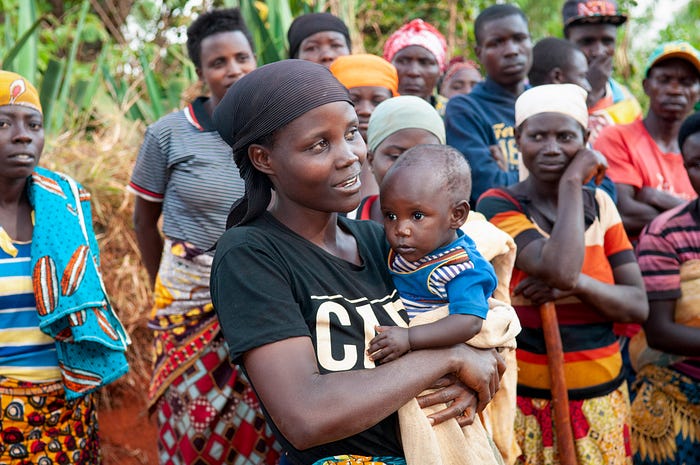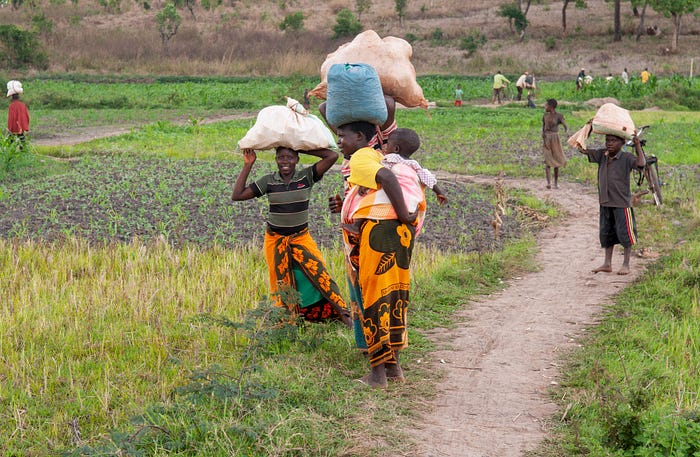COVID-19 and a new way of working

Ramadan Michel gazes over his bounty of maize, cassava, banana and peanuts. Like most Burundians, Ramadan is spiritually connected to his ancestral land, which provides his main source of income. Besides epitomizing his connection to the past, the future of his expanding family depends on its harvests. Along with 400,000 other Burundians, he fled to Tanzania after the failed 2015 coup d’état, to patiently wait out the instability riling his country. But Ramadan’s eventual return home was bittersweet: He was barred from the land that once belonged to him. It was now being occupied and farmed by his cousin. Tensions between Ramadan’s children and his cousin escalated, landing the family in local court. But the issue remained unsettled.
Competition for land
This outcome is unfortunately too common. Competition over fertile land in Africa’s second-most densely populated country is a main challenge to building sustainable peace in Burundi. Lack of livelihood opportunities is a shared issue in fragile borderlands across Africa that are often impacted by complex displacement crises. These are only likely to intensify with the arrival of COVID-19, as communities scramble amidst a shortage of resources. The pandemic response has mostly been concentrated in urban areas. But those likely to be hit hardest by the virus and its side effects may be vulnerable refugees, internally displaced people and their host communities at frontiers of fragile states such as Burundi. These are areas where medical facilities are sparse and the rule of law weak; encampments populated with traders and day labourers are often overcrowded and disease can spread rapidly. The closure of borders reduces opportunities for small-scale cross-border traders as borderlands lose this comparative advantage to other regions.
Professional mediation
Back to Ramadan’s legal case over his disputed land: only after undergoing professional mediation facilitated by a UNDP-led peacebuilding project, were Ramadan and his cousin able to reach a settlement. In this video, in English and French, Ramadan and fellow Burundians share their personal stories on how their lives, dignity and hopes for their future were restored through joining the UNDP–IOM–UNHCR peacebuilding project.
A new sense of community

Esperance and her family came back to Ruyigi, Burundi, with no belongings. Internally displaced and without food or shelter, the family relied on the goodwill of their new hosts. For income, Esperance signed up to a cooperative scheme supported by UNDP, together with the host community. Her family received seeds and training with her hosts on how to grow alternative crops and sustainable agriculture. By producing and selling vegetables in their new cooperative, the returnees and the hosts built a sense of community. The hard work gave Esperance and her co-workers a new form of economic independence, along with mutual trust, and opportunities for advancement.

There are many stories like those of Ramadan and Esperance, as captured in the video and independent project evaluation. Over 2,000 people on the border of Burundi and Tanzania benefited from the project, which aimed to address the root causes of inter-community and cross-border conflicts. As the UN Resident Coordinator in Burundi, Garry Conille, explains in the video, the UN in Burundi and Tanzania wants to comprehensively address the short and long term needs caused by displaced people on both sides of the border, as well as the host communities.
The project started in 2017, backed by a comprehensive conflict analysis of the UN Great Lakes Regional Strategic Framework and financing from the UN Peacebuilding Fund. It assisted refugees, host community members, returnees, and the internally displaced. The project used a people-centered approach for building resilience through jobs and livelihood, bringing together the combined forces of UNDP, IOM and UNHCR to offer immediate protection of the most vulnerable, without losing sight of lasting peacebuilding and development. Mandated to protect refugees and migrants, UNHCR and IOM ensured safe and voluntary returns for Burundians, who also benefited from skills training while living in the camps, and income generating activities upon return, supported by UNDP.

Integrated delivery
At the same time, UNDP established a Community-Based Conflict Resolution mechanism between Tanzanian host communities and refugees. As documented in a recent independent evaluation, the trainings strengthened common understanding and solved family and wider inter-community conflicts between refugee and host communities over food, water, and firewood. In Burundi, UNDP support, based in the so-called 3 x 6 approach, combined sustainable income generating activities with conflict mediation and legal support to settle land disputes. The evaluation found that this support allowed communities to become self-reliant, as they became able to invest in productive assets through cooperative savings.

Leading the implementation of the three-agency cross-border project, UNDP played its SDG integrator role to ensure that the UN’s overall strengths to push towards the achievement of the Sustainable Development Goals were put to use. Linking humanitarian, development, and peacebuilding investments to support border communities in Tanzania and Burundi, the project is a clear example of Delivering as One and the New Way of Working in realizing a Humanitarian Development Peace Nexus.
Two lessons
This story brings two lessons that are relevant to consider for both development, humanitarian and peacebuilding practitioners in designing their comprehensive response to the current COVID-19 times:
· In emergencies such as the Burundi refugee crisis, now compounded by the COVID-19 pandemic, it is critical to maintain the ability to think beyond short-term humanitarian relief. Only by combining a focus on immediate relief and protection of basic human rights with a longer-term vision for how to create economic opportunities while building and sustaining peace between communities, will it be possible to end needs and recover from the various impacts of the crisis. It is nothing new that the only way to meet needs and achieve sustainability is to allow the most vulnerable to have a dignified socially and economically empowered life.
· To deliver solutions that respond to short and longer-term needs requires committed coordination by humanitarian, development, and peacebuilding actors. That is how the UNDP Nairobi Resilience Hub, which works with a comprehensive approach to resilience, founded in the Humanitarian Development Peace Nexus, has supported the delivery of this project across agencies and the border, building on the regional analysis of the UN Great Lakes Regional Strategic Framework.
Written by Mads Knudsen, Cross-border project coordinator, UNDP resilience Hub for Africa. Photos: UNDP Burundi/Patrice Brizard unless noted
